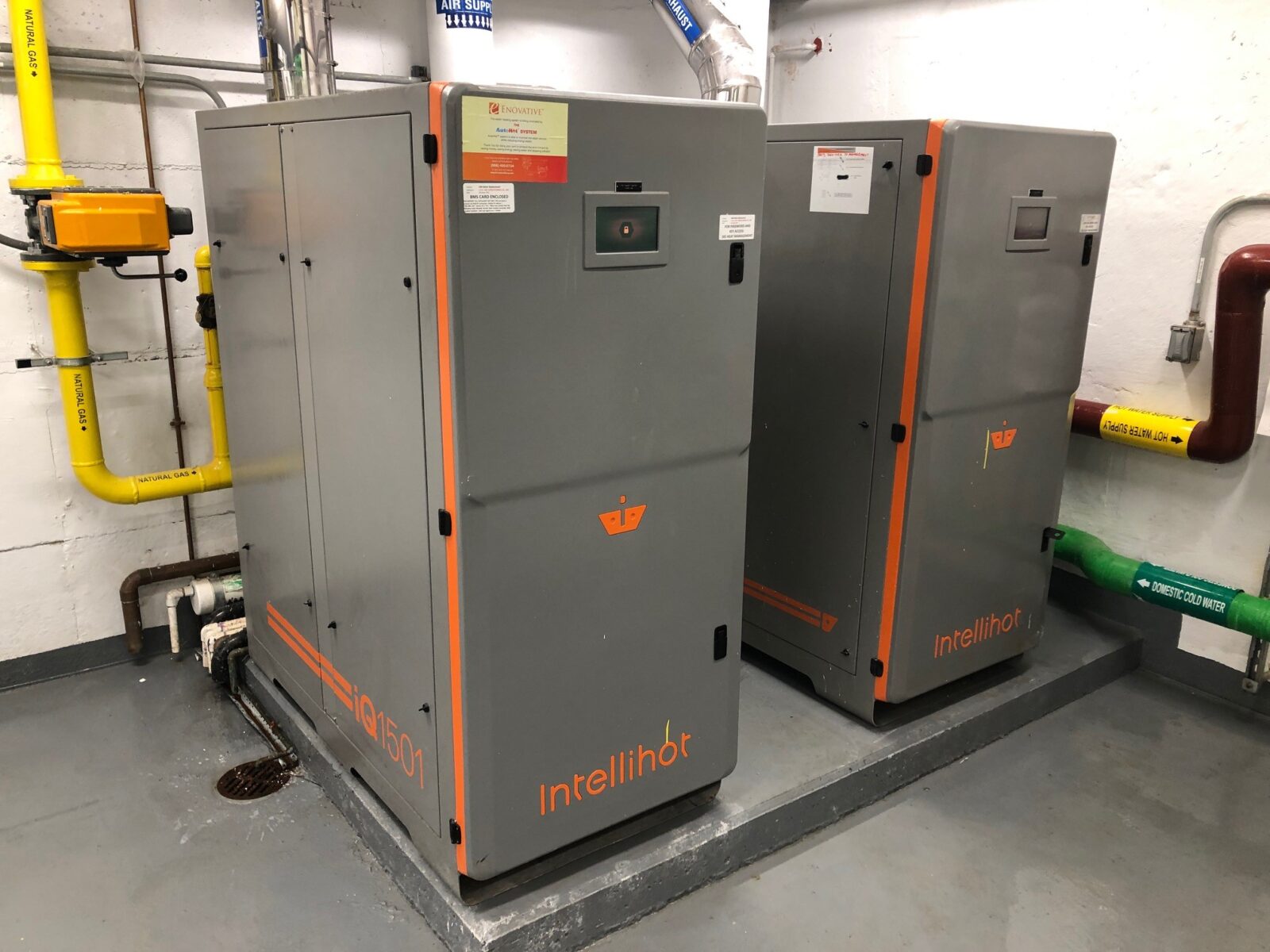Domestic Hot Water (DHW) System

Description
- Domestic Hot Water (DHW) refers to water that has been heated and distributed for sanitary use (Bathing, Showering and other personal hygiene), cleaning use (dishwashing, laundry, etc.), and heating system. The scope involves demolishing, installing, modifying, and replacing, or upgrading domestic hot water systems. The equipment and accessories installation involved Boilers, Hot water storage tank, heat exchangers, circulation pumps, pipelines, flow meter, pressure relief valves/temperature relief valves, shut-off valves, etc. as per the updated NYCDOB plumbing Codes, energy code and ASME pressure vessel codes or standard. The pipes, valves and tank will be supported as per the updated code of NYC Department of Buildings. The pipes will be insulated as per the updated NYC Energy Code. The NYCHA Design Guidelines should be followed.
Baseline
- Hot water lines must be insulated to comply with the NYC Energy Conservation Code.
- NYCHA discourages the use of mixing valves for DHW, but if one is necessary for a particular project, it should be motorized and electronically controlled.
- As per the 2022 NYC Plumbing Code Section 607.1.1, a thermostat control for a water heater shall not serve as the temperature limiting means for the purposes of complying with the requirements of this code for maximum allowable hot or tempered water delivery temperature at fixtures. Specify how the temperature of DHW will be controlled.
- As per NYC Administrative Code Section 27-2031, in multiple dwellings hot water shall be supplied at a constant minimum temperature of one hundred twenty degrees Fahrenheit from a central source.
- Locate heat and DHW equipment above flood elevation.
- Assume high-efficiency gas-fired heaters and pressure boosters as necessary to improve water pressure throughout buildings at each development. Evaluate decoupling domestic hot water and space heating systems where they are currently coupled and centralized. [PACT]
- Provide a preliminary cost estimate for decoupling domestic hot water systems where applicable. [COMPMOD]
- Assume electric heat pump heaters for all buildings. [PACT]
Stretch
- Convert central steam systems to distributed condensing boilers and hydronic convectors.
- Convert steam-to-DHW converters to a gas-fired condensing boiler and storage tank.
- Assume electric heat pump heaters for all buildings and identify a specific system and manufacturer. [COMPMOD]
- Prioritize decentralized and/or distributed domestic hot water systems (per building). [COMPMOD]
- Install heat exchanger from waste lines. This is more feasible if replacing waste lines. [COMPMOD]
- Locations within the sewer system for energy recovery from wastewater are at the apartment level, at building level, and in the sewer pipe network.
- The wastewater shall be prescreened prior to being pumped to the heat exchanger to prevent debris from affecting system operation.
- Due to the chemical and biological properties of wastewater, a biofilm will build up on the heat transfer surfaces which can impair heat transfer. Preventative cleaning of the heat exchanger surfaces is required.
- Manufactures of systems include SHARC Energy Systems – Pirahana Series, Huber Technology – Huber Heat Exchanger Rowin, Huber Technology – Huber Heat Exchanger ThermWin, Renew Ability Energy (REI) – Drain Water Heat Recovery Systems
- Assume electric heat pump heaters for all buildings. [PACT]
- Prioritize decentralized and/or distributed domestic hot water systems (per building or per unit, as appropriate). [PACT] [SA]
- Decouple and electrify domestic hot water systems. [SA]
- Submeter make-up water usage and connect to BMS to monitor both boiler make-up water, condensate tanks, and pumps to identify leaks and quickly repair them. [SA]
- Recycle water in steam condensate heating. [SA]
- Build raised annexes to protect mechanical, electrical, and plumbing equipment. Note, this requires installation of new site-wide distribution. [FR]
Strategies

Optimize Performance, Operation & Maintenance of Buildings, Systems & Assets
CompModPACTSustainability AgendaCommercial BathroomsCommunity CentersCommercial KitchensFlood Resilience
Last Updated on October 10, 2024 at 1:52 pm

















